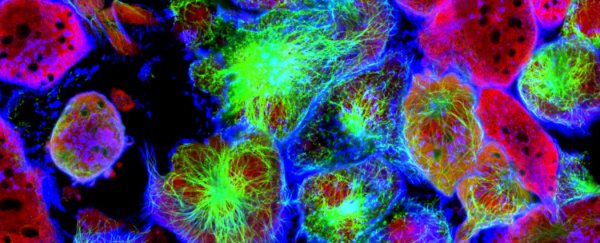Scientists in the US have managed to get cancerous human cells to start growing normally again by injecting them with biological processors called microRNAs.
As cancer cells are just normal cells that grow abnormally, treating them is notoriously difficult - the differences between the cells are in some respects so slight that blasting out the cancerous tissue usually takes healthy tissue along with it. As cells grow and replace each other in our bodies, the final stage is an instruction to stop dividing: it's this step that cancer cells miss and it's what leads to tumours.
Now scientists at the Mayo Clinic in Florida have discovered that microRNAs - biological processors that instruct cells how to divide and grow - control the production of a protein called PLEKHA7, and in cancerous cells the level of this protein isn't where it should be. But by injecting more microRNAs into cancer cells, the team has been able to restart PLEKHA7 production and get them to grow normally again.
The research was carried out in laboratory conditions on human cells from the breast and bladder, so there's a lot of work to do before the process can be transferred to a living human being, but it's a promising start. One of the scientists working on the project compared it to putting the brakes on cancerous growth or discovering the software code to arrest the spread of a tumour.
"This is an unexpected finding," Chris Bakal from the Institute for Cancer Research in London, who was not involved in the research, told The Telegraph. "Normal cells touch each other and form junctions then they shut down proliferation. If there is a way to turn that back on then that would be a way to stop tumours from growing… I think in reality it is unlikely that you could reverse tumours by reversing just one mechanism, but it's a very interesting finding."
The new findings have been published in the journal Nature, and join a number of recent advances in the genetic treatment of cancer cells. "We mustn't get ahead of ourselves… [but] understanding these key concepts is crucial to help continue the encouraging progress against cancer we've seen in recent years," Henry Scowcroft, the senior science information manager at Cancer Research UK, said.
